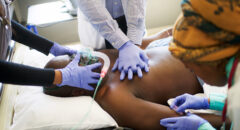
Does your ever heart beat really fast sometimes for no apparent reason? If so, start paying close attention to what you’re eating because the answer could very well lie in your diet.
Lunch meat, potato chips, pickles, nuts, pretzels, instant noodles, French fries, popcorn, frozen and processed foods – if you consume any of these foods on a daily basis, you could easily consume more than the daily recommended intake for sodium – 2,300 mg.
MUST READ: What Causes Feet To Swell?
Though some people can handle consuming more than 2,300 mg of sodium every day, others simply cannot. And if you’re one of those people who cannot, you’ll know it. Heart palpitations, shortness of breath, dizziness, chest pain, fainting, and even swelling of the feet and legs can all be symptoms of salt sensitivity.
Salt sensitivity tends to be more common among African Americans with more than 40 percent of Blacks living with hypertension, according to the American Heart Association.
“Folks with kidney failure or heart failure are also more sensitive to salt and should limit their salt consumption,” says Dr. Bola Oyeyipo, a family physician in southern California and co-founder of Healthgist.com.
African Americans are more prone to having heart failure and kidney failure.
To manage your salt sensitivity, Dr. Oyeyipo recommends, “using a diuretic that works by causing the clearance of salt in the urine.”
Furthermore, choose foods low in sodium and limit your consumption of these foods. So, if you’re used to taking a turkey sandwich every day for lunch, limit that to only once or twice a week. And if you enjoy chips, pretzels and nuts, go with unsalted or lightly-salted instead. For instant noodles i.e. Ramen, don’t use the entire seasoning packet and drain some of the liquid before eating.
Make these small changes and you should notice a major difference in the way you feel. If your symptoms persist, see your doctor.








